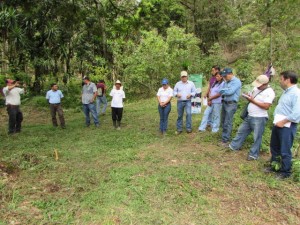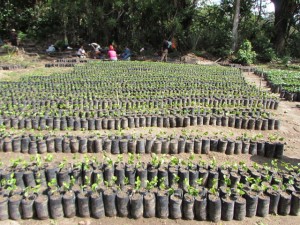Archive for category Christine Young
Maybe ‘sustainable development’ doesn’t have to be an oxymoron…
Posted by Christine Young in Christine Young on June 30, 2015
I’m slowly writing my Masters thesis on the Canadian contribution to the ineffectiveness of community consultation with indigenous communities, prior to the implementation of mining projects in Honduras. As such, reading about Honduras has taken up much of my free time over the past several months. Sorting through free trade agreements, international conventions, journals, and news articles can become daunting after a while. Honduran indigenous groups and communities have faced displacement, land grabs, and degradation of their territory because of foreign mining projects and palm oil production. However, every now and then, when I get to the point where I feel like abandoning my thesis because it all just seems to frustrating and heartbreaking, I find something great – generally something about community initiatives or successful indigenous movements. I had read a bit about community farming initiatives in the country, where the people work together to produce for the shared benefit of the community, and during my time here, I was fortunate enough to witness an example.
In Sauce, a small community in the Department of La Paz, we attended a meeting at a coffee and shade tree nursery, surrounded by coffee farms, banana trees, and mountains. The meeting was attended by the local community members that planted the seedlings and ran the nursery, along with CRS representatives, municipal authorities, and members of local and regional water governance committees. They were all gathered to share the progress that had been made and discuss plans for moving forward.
While the whole meeting was interesting, there was one part that stood out to me in particular. Flora, the President of ASOMAINCUPACO, a community-run water governance body in the El Jilguero region, gave a speech about the gratefulness of the community for the support of international organizations, and the importance of self-sustainability moving forward. She spoke about the shared interests of the community and the need for their vision to be maintained going forward. She reiterated the successes that they had achieved together and how they could continue to build upon this and create a sustainable future that would allow them to continue to provide for their families while also conserving their environment and water sources for the future.
Flora’s speech was short and to the point, but it resonated. The people in this region have been fighting for years to protect their land from deforestation, valuing preservation over profit. Meanwhile, many of the communities have completely embodied conversation practices, ensuring that their means of production will not endanger the water that they depend on, nor the environment around it.
The brilliant environmentalist, Vandana Shiva has pointed out time and time again, and my thesis research has reaffirmed, that we allow our rivers and lakes to become polluted in the search for profit from other natural resources, when, in essence, it is the water that is the most valuable. In the small towns of rural, southern Honduras water is valued in this way and the protection of watersheds is the norm.
The ideology of water as a communal, human right has helped to unify communities and instil an environmental consciousness that will ensure clean water and Healthy forests and farmlands for generations to come.
‘De los Buenos, Somos Más’
Posted by Christine Young in Christine Young on June 14, 2015
I had a conversation (maybe more accurately, a bombardment of questions about Honduras) with a member of COCEPRADII (Comité Central Pro Agua y Desarrollo Integral de Intibucá), Carlos, a few nights ago. During which, he told me something that I have seen many examples of recently. While in the midst of asking him his thoughts on the current President, the effects of foreign mining projects, and gang violence, he stopped me and said that the most important thing to remember in the midst of any problems Honduras may have is that “de los Buenos, somos más.” Unfortunately, this sentiment, which is beautiful in Spanish doesn’t translate that well – ‘of the good; we are more’- but hopefully the message remains the same…
Photo: “Our bodies and lands are not market goods”, “Respect earth, equity, justice, peace, love, life, dignity, participation”, “Inclusion, happiness, liberty, sovereign autonomy”
Good news, for a change
Posted by Christine Young in Christine Young on June 6, 2015
On May 25 I arrived in Tegucigalpa, Honduras. Freshly departed from an intense year of classwork for my master’s in international law and the settlement of disputes, my perspective on the state of the world was, in all honesty, quickly slipping from pragmatic to cynical. I was not expecting that arriving to research conflict in a country that most often makes news headlines for its high murder rates, gang violence, and political impunity, would so quickly bring me back from this.
Since arriving here in Honduras, we have been inundated, not with stories of tension and unresolved conflict, but with stories of collaboration, grassroots community development, and inspirational success. In the mountainous southern regions where we are working, coffee farming and water issues are inextricably linked. Thus, a main issue facing farmers and communities is securing watersheds (cuencas de agua) from fertilizers and other contamination created by the neighbouring coffee plantations, and agreeing on how to do so. Several regions of Honduras have already mastered this task, while others are on their way. The people we are here to work with have been the driving force behind much of this progress, and I am looking forward to hearing their experiences and learning as much as I can from them in the short time we are here.
This is my third time in Honduras and I hope not my last. Over the next few weeks, I hope to show you the Honduras that isn’t in the headlines (but should be) and share with you the reasons why I keep coming back…
Photo: Tegucigalpa, Honduras






